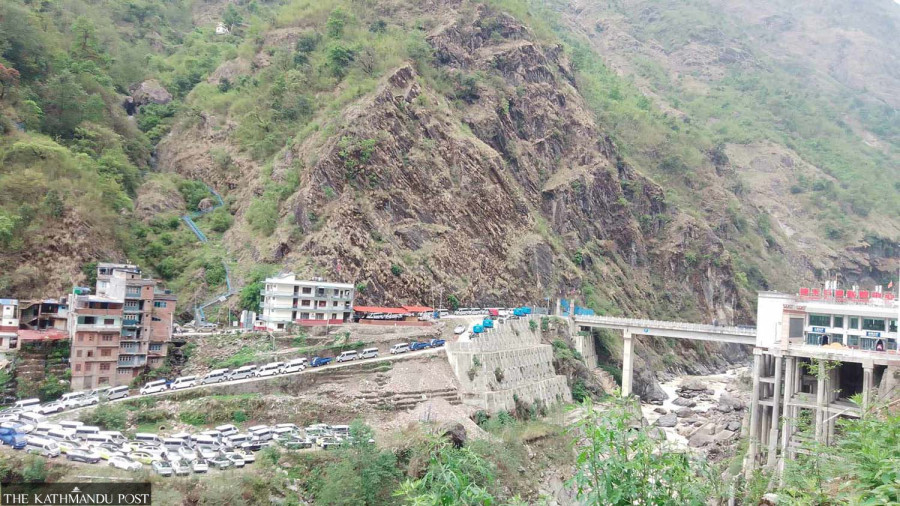Money
Tatopani trade slows sharply as China sends few containers
Traders suspect unofficial blockade, but Nepali officials deny any obstruction.
Krishana Prasain
Despite the Tatopani road being reopened after maintenance, China continues to send only a few containers to Nepal, leaving traders puzzled and frustrated over the slow flow of goods.
Traders said the limited number of containers being dispatched from the Tibetan border town of Khasa across Sindhupalchok feels like an unofficial blockade linked to political uncertainty in Nepal.
“Chinese authorities are sending just three to four containers daily from Khasa, and we don’t know the exact reason behind this. Sending such a small number is meaningless when hundreds of containers remain stranded on the Chinese side,” said Ram Hari Karki, president of the Nepal Trans Himalayan Border Commerce Association.
According to the association, around 900 containers loaded with festival-targeted goods have been stuck in China for nearly three months.
Karki said traders have repeatedly requested Nepal’s consul general in Lhasa, Laxmi Prasad Niraula, to take up the matter with Chinese officials and increase daily dispatches. “Even Niraula seems unaware of the reason behind the restricted flow, and efforts to initiate dialogue with Chinese authorities haven’t worked,” Karki added.
The Tatopani road reopened after Dashain, and traders say there are no significant obstructions. “If China had dispatched the containers regularly, most stranded vehicles would have arrived,” traders said.
Once Nepal’s primary trade route with China, Sindhupalchok’s Tatopani border has faced frequent disruptions since the 2015 earthquake. Seasonal landslides and poor infrastructure have made the route unstable. The Khasa-Tatopani stretch, in particular, is vulnerable to blockages during monsoon.
At the Rasuwagadhi crossing in Rasuwa district, a flash flood from the Chinese side in July washed away the border bridge and damaged customs facilities. The alternative Tatopani route has also faced repeated landslides along the Araniko Highway.
China is Nepal’s largest supplier of goods during the festival season, especially garments, decorative items, and electronics. With both Rasuwagadhi and Tatopani facing restrictions, traders run short of stock.
After Dashain goods were stranded, many traders began using the newly opened Korala customs point in upper Mustang that was inaugurated in November 2023. Around 200 Nepali containers have entered via Korala so far, with one or two containers arriving daily.
However, traders say plunging temperatures in the mountainous region are making transport increasingly difficult.
The delay in festive shipments has caused severe losses. “Even though some goods were diverted via ship, a large volume remains stuck along the northern border,” said one trader.
However, Nepali officials deny that trade has been obstructed.
Bandhu Prasad Bastola, chief district officer of Sindhupalchok, said container dispatches from China fluctuate daily.
“Some days the number is high, and on others, it’s low. But no cargo containers are stranded on the northern border,” Bastola said. “We are coordinating through our ambassador in Beijing and the consul general in Lhasa, and there is no major problem.”
Customs officials, however, acknowledge a slower pace of trade. “I was recently posted here, but staff told me that cargo vehicle traffic is lower compared to last year,” said Rajendra Prasad Chudal, chief of the Tatopani customs office.
He added that while the number may not be as low as three or four per day, it has dropped. “On Friday, 15 Nepali containers arrived; on Thursday, 14; on Wednesday, 9; and on Tuesday, 25.
Most carried apples, dry fruits, and other festival items.”
Chudal said Chinese authorities had informed them that the slowdown was due to traffic congestion caused by the Kailash-Manasarovar pilgrimage season.
Traders are hopeful that the completion of the Miteri Bridge at Rasuwagadhi will soon reopen the Kerung border point. “We have heard that the Kerung checkpoint will reopen on a trial basis from October 25,” said Karki. “But even then, we are unsure whether the transport of goods will resume immediately.”
Before the July landslide, nearly 40–50 Chinese containers entered Nepal daily through the Kerung route. The road on the Nepali side is still under repair.
The Rasuwagadhi–Kerung crossing was officially opened in December 2014 and upgraded to an international checkpoint in 2017, allowing cross-border travel with passports and visas. Since then, it has become Nepal’s second-largest trade gateway with China after Tatopani, handling a significant portion of imports and exports.
According to the Department of Customs, Nepal imported goods worth Rs341.10 billion from China in the last fiscal year while exporting goods worth Rs2.63 billion. The trade deficit stood at Rs338.47 billion during the review period.




 10.12°C Kathmandu
10.12°C Kathmandu













